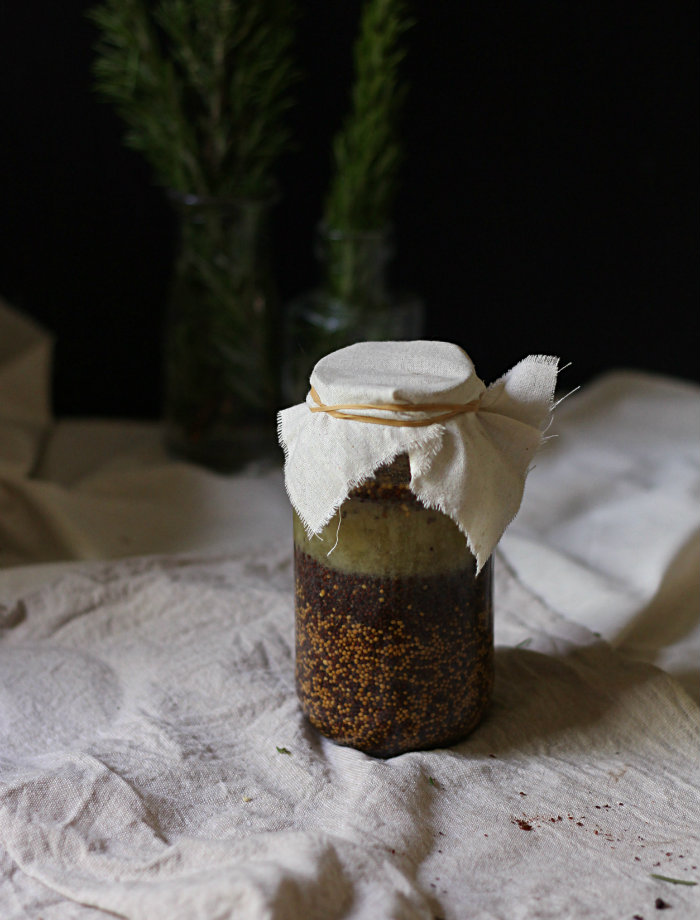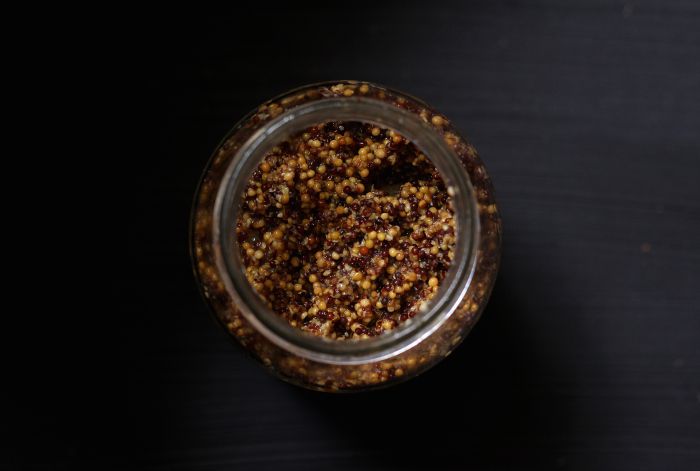
The other week I went along to a fermented foods workshop. I’ve posted a little on here in the past about the benefits of including fermented foods in your diet, mostly in relation to fermented drinks such as kefir, but I thought I would recap a little.
The process of fermentation sees naturally occurring bacteria feed on the sugar and starch preset within food which creates lactic acid. This process actually helps to preserve the food which helps to explain why these traditional methods were so popular years ago before the introduction of refrigeration and the mass production of processed foods. With these advances, we have seen a sharp decline in these traditional processes, and along the way, lost a lot of the health benefits associated with these practices. There is an increasing amount of research being produced over the past decade or so showing how incredibly important it is to have a healthy gut, and how gut health can impact our overall health.
Our guts need both good and bad bacteria, and with the prevalence of bad bacteria in western life today, resulting largely from lifestyle choices such as diets high in sugary and fatty processed foods, and drinks such as alcohol, sugary sodas and caffeine; stress; antibiotic usage; plus other environmental factors such as poor air quality. Thus it’s important to ensure that we keep up the levels of good bacteria.
So, why exactly is it so important that we have healthy gut bacteria?
A healthy gut means less digestive issues
We live in an age where gut and digestive issues such as IBS, SIBO, leaky gut and other digestive issues are becoming increasingly common. A healthy gut with a balance of good and bad bacteria will help to right these issues and assist with the digestion of food, encouraging “normal” bowel movements and promoting the absorption of vitamins from the food we eat.
Our gut is our second brain
Research is continually showing how important our gut is in determining overall levels of health. This isn’t specifically related to just the digestive issues above however, recent research has linked gut health with mood and stress levels.
A healthy gut means less colds and flus!
70% of our immune system exists in the gut, which means that a healthy gut equals a stronger immune system to ward off cold and sickness.
And if the health benefits aren’t enough to convince you to make your own mustard, it also works out to be far more economical – a small jar of mustard costs around $3 – 4 here in Australia, however this recipe makes about three times the amount for roughly the same amount of money.

Here, I’ve adapted one of the recipes from the workshop and made a simple Seeded Honey Mustard. I’ve used whey here which was left over from the Baked Ricotta I made the other week, however if baked cheesy goodness isn’t enough to entice you to try your hand at making your own ricotta, you could use kombucha or water kefir instead, which will also slowly ferment the mustard adding additional nutritional benefits. I haven’t tried this myself, though I have seen a few recipes floating around the internet so you should be able to easily find other recipes if you prefer to go down this route. This is also a great option if you want to make a vegan alternative.
This recipe makes just shy of two cups worth of mustard. Mustard has many uses such as a marinade for meat and fish, blended with olive oil and lemon juice to make a salad dressing, or slathered on some crusty sourdough with some sharp cheddar. Or – add it to some creamy cashew cheese for an extra kick. If you have any other great ideas for mustard use, please feel free to share in the comments below.
- ½ cup each brown and yellow mustard seeds
- ⅔ cup water
- ¼ cup whey
- ¼ raw apple cider vinegar
- ½ Tbsp salt
- 2 tsp dry mustard powder
- 2 Tbsp raw honey
- Combine all ingredients in a glass jar and mix well. Cover and allow to sit for 2 to 3 days at room temperature.
- The ingredients will separate during the fermentation process - this is normal, just give it a little stir to combine the ingredients again.
- Taste after this time and when it tastes right to you, transfer to the fridge. It will continue to ferment in the fridge, but at a much slower rate. You can also blend the mustard in a high-powered blender such as a Vitamix at this point if you want it a bit smoother - you can either blend it entirely or just pulse a few times so that some of the seeds remain whole.
- This will last up to 3 months refrigerated.
Wow, I didn’t know fermented foods were that healhy. Definitely gonna include more of it to my diet.
Homemade mustard sounds heavenly. I love mustard but have never made it myself. Pinned :D
Fermented foods are great for your gut health. They all have different strains of healthy bacteria too, so its a good idea to include a few different varieties. Fermented mustard is really simple and a great way to try fermenting at home :)
love this beautifully simple recipe, dearna. do you know if substituting lemon juice for the whey might work as a dairy-free option?
Thanks Jaime :) If you cant easily get some kombucha or kefir, apple cider vinegar is another great option to use which would make it dairy free, and still retain a lot of health benefits.
This is such a great post – I’ve just started to dive into fermenting and this would be a good start! Thank you!
Thanks Alessandra – great to hear, and yes, the perfect place to start :) Hope it goes well!
Awesome post love. Highlighting gut health is so important! Isn’t it amazing you can ferment sauces too! At work they do a lacto fermented tomato sauce – its awesome!
Oh wow that sounds great – I might have to try my hand at that next :)
Hi! I am thinking about making this as a christmas gift, but I’m unsure if I can leave the mustard unrefrigerated after making it. I’m thinking between making it, having someone open it on Christmas, and having a place to put it in the fridge, it would go about two weeks unrefrigerated. Please let me know!
Hi Camille, if you leave it at room temperature it will continue to ferment. I have had mine out of the fridge for extended periods, but I cant guarantee a certain time frame as there are so many variables when it comes to fermented foods. Could you store it in the fridge until you gift it?